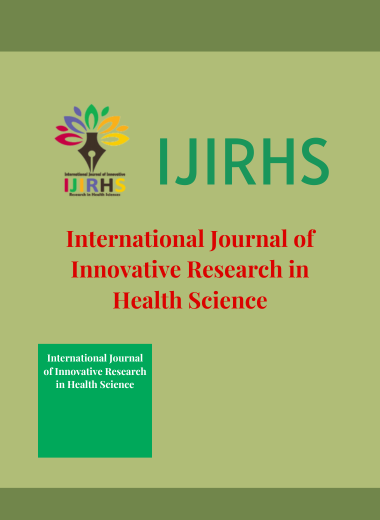- Keerthana V.R, Vinitha Devakumari P, Hema V.H, Parameswari M, Abinaya, Kerith Evangeline, and Ferzina
- Volume 1, Issue 3, 2025
Address:
KEERTHANA V.R. 1, VINITHA DEVAKUMARI. P 2, HEMA V.H 3, PARAMESWARI.M 4, ABINAYA 5, KERITH EVANGELINE 6, FERZINA 7
- Tutor, Obstetrical and Gynecology Nursing, Faculty of nursing, Dr.M.G.R. Educational and Research Institute, Deemed to be university Chennai, India.
- Tutor, Obstetrical and Gynecology Nursing, Faculty of nursing, Dr.M.G.R. Educational and Research Institute, Deemed to be university Chennai, India.
- Professor cum Principal, Faculty of nursing, Dr.M.G.R. Educational and Research Institute, Deemed to be university Chennai, India.
- Professor cum Vice Principal, Faculty of nursing, Dr.M.G.R. Educational and Research Institute, Deemed to be university Chennai, India.
- Nursing tutor, Saveeth college of nursing, Chennai, India.
- Medical and surgical in nursing, Dr.M.G.R. Educational and Research Institute.
- Medical and surgical in nursing, Dr.M.G.R. Educational and Research Institute
ABSTRACT
Introduction: Biomedical waste management is crucial for healthcare facilities to prevent harm to human health, protect the environment, and comply with regulations. It can be categorized into infectious, hazardous, radioactive, sharps, and general non-hazardous waste. Aim of the study: The aim of the study to determine the Knowledge and Practice regarding Bio- Medical Waste Management among Group–d workers in selected Hospital, Chennai. Methodology: This study adopts quantitative research. A descriptive research design was employed. The variables included demographic, as well as research variables focused on knowledge and practice related to biomedical waste management. Results: Results from this study showed that 90% participants demonstrated inadequate knowledge alongside 10% who demonstrated moderate knowledge and no participants showed adequate knowledge. The practice levels among participants included 10% with good practice and 83% with average practice along with 7% with poor practice. Conclusion: The study highlights the urgent need for targeted training programs to enhance biomedical waste management knowledge and practice among Group-D workers, improving hospital waste management efficiency.
Keywords: Biomedical waste management, Hazardous, Knowledge, Practice
- Keerthana V.R, Vinitha Devakumari P, Hema V.H, Parameswari M, Abinaya, Kerith Evangeline, and Ferzina (2025). A study to determine the Knowledge and Practice regarding Bio- Medical Waste Management among Group–d workers in selected Hospital, Chennai. International Journal of Innovative Research in Health Science, 1(3), 9-18.



